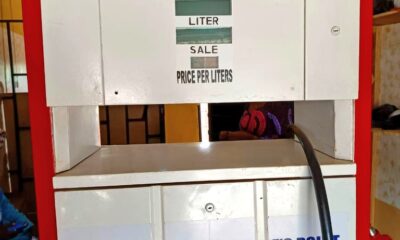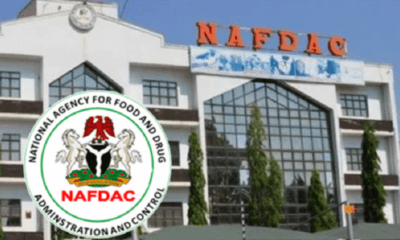Business
Narcotics consumption: We will only make it available to medical professionals — NAFDAC

…Vows to curb illicit use
T he Director General, National Agency for Food and Drug Administration and Control (NAFDAC), Prof Mojisola Adeyeye has reiterated the Agency’s commitment to ensuring the availability of narcotics and controlled substances for medical and scientific purposes while preventing diversion to illicit use in Nigeria.
The assertion, however, came against the backdrop of the unprecedented outcry by the Provost of the Medical School, University of Lagos, Prof Adewale Anthonio Oke that some surgeons and other medical professionals involved in the surgical operation of patients tend to be addicted to narcotic drugs used as painkillers for patients after surgery.
Speaking at the launch of the International Narcotics Control Board (INCB) annual report availability supplement and precursor report 2023 by NAFDAC in Lagos on Thursday, Prof Adeyeye admitted that narcotics and psychotropic substances are indispensable in the management of pains and other medical conditions.
However, due to the addictive potential of many of them, she noted that there is a need to balance the access and control of these substances, adding that INCB therefore reports the world drug situation yearly to inform governments of countries that are party to the International Conventions on drug control efforts.
According to her, the annual report for the year 2023 has a special focus on the role of the Internet, including social media, in drug trafficking and use. It explores the challenges and opportunities for drug control, prevention, and treatment, in the era of the Internet, with a specific look at the evolving landscape of online drug trafficking.
The NAFDAC boss who was represented by the Director, Laboratory Services (Food), Dr Charles Nwachukwu, however, stressed that Competent National Authorities must scale up their activities, and monitor online advertisement and sales of controlled substances to stay ahead of traffickers.
The report further analyses the global availability of narcotic drugs and psychotropic substances for medical and scientific purposes. It highlights the persistent disparities in access to medicines for the treatment of pain. The precursors report x-rays issues related to trafficking in synthetic drugs including non-medical synthetic opioids, cocaine and their precursors which represent a growing threat to public health.
The DG reiterated some of the measures already put in place by NAFDAC to ensure availability and prevent the diversion of controlled medicines to illegal use.
E -permit issuance: The Agency has commenced the issuance of an electronic permit to import controlled substances since 2017 with the intention to link this process to the international Import and Export Authorization system (I2ES).
Pre-Export Notification (PEN) Online System: This platform has been of great utility in monitoring international trade in controlled medicines and precursor chemicals. Its use is to confirm the legitimacy of transactions of proposed imports.
Monitoring the integrity of the distribution chain: The Agency is scaling up its monitoring and surveillance of the distribution chain by verification of sales, documentation review and increasing the frequency of warehouse and facility inspection.
National Drug Control Master Plan (NDCMP): This is a multi-agency, multi-sectoral strategic planning and implementation framework that covers key aspects of drug supply and reduction impacting Nigeria. It is aimed at strengthening responses to drugs to contribute to the enhanced health, security and well-being of all Nigerians.
National Pharmaceutical Traceability: NAFDAC’s traceability implementation strategy is in line with the Nigeria National Traceability Strategy Policy document published by the Federal Ministry of Health in May 2020. The implementation started with controlled substances in January 2024. Other pharmaceutical products will be added in due course.
Global Rapid Interdiction of Dangerous Substances (GRIDS): INCB Regional Technical Officer for Central and West Africa has been selecting focal points for multi-agency training courses on real-time communication and intelligence sharing tools (IONICS and GRIDS intelligence) and awareness raising and safe handling of dangerous substances in the region. This aims to support law enforcement and regulatory agencies to identify and dismantle criminal organisations through the identification of modus operandi, risk profiling operations, and the exchange of information for launching and supporting investigations and enforcement operations against the trafficking of new psychoactive substances (NPS), non-medical synthetic opioids, and other dangerous substances.
Drug Demand Reduction Activities: The Agency carries out education and awareness campaigns in schools, workplaces, religion organizations, marketplaces etc. and collaborates with National Drug Law Enforcement Agency (NDLEA) NGOs and other relevant organisations to create drug abuse sensitization across the country.
She, however, acknowledged the collaborative efforts and cooperation of sister agencies like the Nigeria Customs Service, National Drug Law Enforcement Agency (NDLEA), and The Nigeria Police, who have all been of tremendous help to the agency.
Speaking in the same vein, Provost of the Medical School, University of Lagos, Prof. David Adewale Anthonio Oke, underscored the aptness of the occasion, given the fact that in clinical practices, several drugs and derivatives of narcotics, particularly opium and their derivatives are used in pain management, most especially in some critical conditions that involve excruciating pains.
Prof Oke, who was represented by Prof Olatunji Aina, a professor of Psychiatry at the College of Medicine disclosed that not only the members of the public indulge in abuse of medical narcotics. He lamented that doctors and other professionals that have these drugs in custody at the hospitals overtime tend to be addicted to the drugs they administer to the patients.
“Even amongst our colleagues in the health practice, especially those that work in the theater including professionals that are directly in charge of these drugs, some of them overtime tend to be addicted to the drugs,” he said, describing it as a big public health problem that only a collaboration between NAFDAC and NDLEA could nip in the bud.
He explained that some medical conditions like sickle cell disease crisis, orthopedic cases, particularly fracture cases and in the management of cancer, would warrant giving some of these narcotics to the patients to relieve them of severe pain.
He averred that severe pain is one of the symptoms in most cases of cancer when the tumor is exerting pressure on a certain part of the body, adding that in post-surgery, quite a number of these drugs are used in management of pain after surgery.
According to him, the dilemma of the physician is when the patient now becomes addicted, stressing that it is very important to know at what point a patient no longer requires analgesics and has become addicted.
In some cases, he said sometimes when you think the clinical situation has improved and would not warrant demand for analgesics, such patients still demand the drugs.
“I’m very happy about the control of these medicines by NAFDAC because it’s one of the commonest problems we have in psychiatry, particularly patients that are addicted to the controlled medicines and injections,” he said.
Business
Dangote Refinery will get valid operating licence soon – FG


The Federal Government announced that it is set to issue a fully valid operating licence to the 650,000 barrels per day capacity Dangote Petroleum Refinery.
It announced this at the Stakeholders’ Consultation Forum on Midstream and Petroleum Host Community Development Trust Regulations organised by the Nigerian Midstream and Downstream Petroleum Regulatory Authority in Abuja.
The NMDPRA, an agency of the Federal Government, however, explained that though it had awarded a pre-commissioning licence to the $20bn refinery, a fully valid operating licence would be issued to the Dangote refinery soon.
Dangote refinery was inaugurated by former President Muhammadu Buhari in May 2023. The facility started releasing Automotive Gas Oil, popularly called diesel to the domestic market in April this year. It has yet to release Premium Motor Spirit, popularly called petrol.
Speaking at the forum in Abuja on Tuesday, the Chief Executive, NMDPRA, Farouk Ahmed, told industry players and other stakeholders that the authority would issue a fully valid operating licence to the refinery very soon.
Ahmed, who was represented by the Executive Director, Distribution Systems, Storage and Retailing Infrastructure, NMDPRA, Ogbugo Ukoha, pointed out that currently, only three refineries have valid licences.
“We have issued three refineries with three valid licences. We awarded to Dangote refinery even in their pre-commissioning and sooner than later they will have full commission and a valid licence to also operate,” he stated.
He also stated that about 15 gas facilities across the country have valid licences while more are undergoing processing.
The NMDPRA boss said there are 1,199 facilities with valid licences in the downstream, while more than 176 operators hold gas import permits.
Ahmed said 130 depots have valid licences while 69 hold valid coastal vessel licences, adding that NMDPRA has licensed 9,464 retail outlets as of 10 am on April 30, 2024.
“In the gas processing facility within the midstream, there are about 15 of them with valid licences. And much is under processing. If you go to the downstream sector, in the gas state of the downstream, more than 1,199 facilities have NMDPRA valid licences.
“More than 176 operators hold gas import permits. In the liquid licensing side of the downstream, there are 130 depots with valid licences and coastal vessels of more than 69 valid licences as of today. And in the retail outlets, we have 9,464 licensed retail outlets as of 10 am today, April 30,” Ahmed stated.
He explained why locations in the midstream and downstream arms of the oil sector were included as part of host communities, stating that emissions and effluence affect them.
Ahmed said the authority organised the forum for stakeholders to ventilate their ideas and proffer measures that would further enable the NMDPRA to relate better with host communities in the mid and downstream arms of the oil sector.
Business
Cost of healthy diet stood at N982 in March – NBS


The National Average Cost of a Healthy Diet (CoHD) per adult a day stood at N982 in March 2024, the National Bureau of Statistics (NBS) has said.
The NBS said this in its CoHD report for March 2024 released on Tuesday in Abuja.
The bureau said the CoHD in March increased by 4.7 percent compared to the N938 recorded in February.
The NBS said the CoHD was the least expensive combination of locally available items that met globally consistent food-based dietary guidelines.
It said it was used as a measure of physical and economic access to healthy diets.
“This is a lower bound (or floor) of the cost per adult per day excluding the cost of transportation and meal preparation.”
The bureau said that to compute the CoHD indicator, the following data on Retail Food Prices, Food Composition Data, and Healthy Diet Standard were required.
The NBS also said that in March, the average CoHD was highest in the South-West at N1,198 per adult per day, followed by the South-East at N1,140 per day.
It said the lowest average CoHD was recorded in the North-West at N787 per adult per day.
The NBS further said that at the state level, Ekiti, Lagos, and Abia recorded the highest CoHD at N1330, N1249, and N1215.
The bureau said Katsina recorded the lowest CoHD at N739, followed by Sokoto and Zamfara at N758 and N766.
The NBS said CoHD had steadily increased since the first CoHD report by the bureau in October 2023.
“The CoHD in March 2024 is 40 per cent higher than what was recorded in October 2023 at N703 and five per cent higher than CoHD in February 2024, which was N938.
“The food groups that have driven the increases in CoHD the most are vegetables, starchy staples, and fruits. The cost of meeting the recommendations for oil and fats have changed the least.”
According to the report, animal-source foods are the most expensive food group recommendation to meet in March, accounting for 37 percent of the total CoHD to provide 13 per cent of the total calories.It noted that fruits and vegetables were the most expensive food groups in terms of price per calorie.
“They accounted for 12 percent and 14 percent, respectively of the total CoHD while providing only seven per cent and five per cent of total calories in the Healthy Diet Basket.
“Legumes, nuts and seeds were the least-expensive food group on average at six per cent of the total cost.”
The report also said that in recent months, the CoHD had risen faster than general inflation and food inflation.
“However, the CoHD and the food Consumer Price Index (CPI) are not directly comparable.
“The CoHD includes fewer items and is measured in Naira per day, while the food CPI is a weighted index.
“The food CPI increased approximately by four per cent between January and February, while CoHD increased by nine per cent.”
The NBS said the policy implications of these results would foster collaboration among a wide range of stakeholders, such as policymakers, researchers and civil society actors that focus on food security.
“These stakeholders will devise strategies that tackle access, availability, and affordability of healthy diet effectively.
“Also, future research incorporating income can also be used to determine the proportion and number of the population that are unable to afford a healthy diet,” the report said.
Business
Seplat Energy achieves 2.3 million hours without LTI in Q1 2024


Seplat Energy PLC has disclosed that it achieved more than 2.3 million hours without Lost Time Injury (LTI) at Seplat-operated assets in Q1 2024.
This was disclosed in the energy company’s unaudited results for the three months ended 31 March 2024.
For the period under review, production averaged 49,258 barrels of oil equivalent per day (boepd), down 4.8 percent on prior period (3M 2023: 51,720 boepd), but 5.7 percent above Q4 2023 production, and towards the upper end of 2024 guidance (44,000 boepd – 52,000 boepd).
The Company also applauded the progressive moves taken by President Bola Tinubu and the industry regulators, following the signing of the executive orders that will provide fiscal incentives in Nigeria’s gas and midstream businesses. In addition, an executive order was signed and gazetted into law, which has the potential to materially improve our contracting process and bring the right level of efficiency that will support cost reductions. This can drive the much-needed efficiency gains across our industry.
The Nigerian Midstream and Downstream Petroleum Regulatory Authority (NMDPRA) recently lifted the domestic gas price to $2.42/Mscf supporting revenue generation and re-emphasising the government’s commitment to develop Nigeria’s gas resources, a factor aligned with Pillar 2 in our strategy.
According to Seplat Energy, the message to investors on the acquisition of ExxonMobil’s share capital in Mobil Producing Nigeria Unlimited (MPNU) is unchanged. Dialogue between key parties is active and constructive, and the company remains confident that a conclusion will be reached on the transformational acquisition.
Commenting on the results, Chief Executive Officer, Seplat Energy Plc, Roger Brown said, “Seplat Energy continued its trend of strong operational performance in the first quarter. Oil production on OMLs 4, 38, 40 and 41 outperformed expectations, benefiting from low pipeline losses and deferments, which were ahead of plan. Cash flow was down in the first quarter, but this is largely due to the timing difference of lifting oil from the terminals. The business remains strong, production is firmly on track this year and price realisations remain supportive of cash generation.
“In our FY 2023 results we outlined several growth opportunities for 2024. The first of these to start generating revenue for Seplat is Sibiri, which came on stream just a few weeks after the FDP approval was received from NUPRC. At Abiala (a marginal field within OML 40), the drilling programme is on track to start during 2Q. We were delighted to see resumption of operations on the Trans Niger Pipeline in April, approximately four months ahead of plan. Access to the pipeline will enable us to increase production from OML53, as well as providing the primary export route for condensate from AGPC, which remains on track for first gas in 3Q 2024.
“Looking further forward, we are pleased to share that we discovered hydrocarbons in deeper reservoirs than had previously been tested at Sapele-37 and Okhorpuru-9. The initial results are promising, again highlighting the world class quality of the geology in Nigeria.
“In Nigeria, we were pleased to see more progressive actions taken by President Tinubu and the industry regulators. In March, the President signed executive orders that will provide fiscal incentives in our gas and midstream businesses. In addition, an executive order was signed and gazetted into law, which has the potential to materially improve our contracting process and bring the right level of efficiency that will support cost reductions. We applaud the change, which can drive much needed efficiency gains across our industry. More recently NMDPRA lifted the domestic gas price to $2.42/Mscf supporting revenue generation and re-emphasising the government’s commitment to develop Nigeria’s gas resources, a factor aligned with Pillar 2 in our strategy.
“Our message to investors on MPNU is unchanged. Dialogue between key parties is active and constructive, and we remain confident that we can reach a conclusion on this transformational acquisition,” he said.
-
capital market2 years ago
Rt.briscoe, FBNH, Others halts negative performance of stock market
-
Finance3 months ago
Court orders Sen. Victor Umeh to repay N136m bank debt to AMCON
-



 Abuja Update2 months ago
Abuja Update2 months agoUNDP, FG partnership needed to achieve inclusion, equity- Minister
-
Abuja Update1 month ago
Banks drive stock market performance with N147bn gain
-



 Business1 week ago
Business1 week agoTingo Group unveils Tingo Electric, Tingo Cola drink at Lagos launch
-



 Health2 weeks ago
Health2 weeks agoCapacity training will reduce migration of health workers- NPHCDA
-
News4 months ago
Oil thieves sponsoring malicious media campaign against Navy – Spokesman
-



 Infotech1 month ago
Infotech1 month agoWorld Backup Day: NITDA urges Nigerians to ensure backup of data














